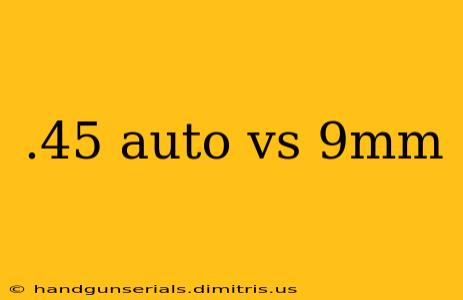The age-old debate: .45 ACP versus 9mm. For decades, handgun enthusiasts, law enforcement professionals, and self-defense advocates have fiercely debated the merits of these two popular calibers. This in-depth comparison will delve into the ballistics, stopping power, recoil, capacity, and cost to help you make an informed decision about which cartridge best suits your needs.
Ballistics: A Deep Dive into the Numbers
Understanding the ballistics of each cartridge is crucial. Let's compare key metrics:
| Feature | .45 ACP | 9mm Parabellum (Luger) |
|---|---|---|
| Caliber | .45 inches (11.43 mm) | 9mm (9 x 19mm) |
| Bullet Weight | Typically 230 grains (14.9 grams) | Typically 115-147 grains (7.4-9.5 grams) |
| Velocity | ~850-1000 feet per second (fps) | ~1100-1250 feet per second (fps) |
| Energy | ~350-500 foot-pounds (ft-lbs) | ~300-450 foot-pounds (ft-lbs) |
| Stopping Power | Generally perceived as higher | Generally perceived as lower, but debated |
As you can see, the .45 ACP boasts a significantly larger bullet diameter and heavier bullet weight, resulting in higher energy transfer at lower velocities. However, the 9mm compensates for its smaller size with higher velocity, leading to a comparable, albeit differently delivered, energy transfer in some instances.
Stopping Power: Myth vs. Reality
The concept of "stopping power" is often debated and misunderstood. While the .45 ACP's larger diameter and heavier bullet create a larger wound cavity, the 9mm's higher velocity and potential for multiple shots placed accurately might be more effective in incapacitating a threat. Ultimately, shot placement is the most significant factor determining effectiveness, regardless of caliber. Mythological claims of one caliber's inherent superiority over the other are generally unsupported by rigorous scientific testing.
Recoil: Managing the Kick
The .45 ACP is known for its substantial recoil, making it less manageable for smaller shooters or those new to firearms. The 9mm's lighter recoil allows for faster follow-up shots and potentially greater accuracy during rapid firing. This is a significant consideration for self-defense scenarios where multiple shots may be necessary.
Magazine Capacity: Rounds on Tap
Generally, 9mm handguns offer significantly higher magazine capacities than .45 ACP handguns, providing more rounds in a self-defense situation. This advantage can be critical if multiple threats are encountered.
Cost: Ammunition and Maintenance
Both .45 ACP and 9mm ammunition are widely available, but 9mm is typically less expensive to purchase. This difference can be substantial over time, especially for those who practice regularly. The cost of maintenance and parts may also vary slightly between the two calibers, but generally, it's comparable.
The Verdict: Choosing the Right Caliber
There is no single "best" caliber. The ideal choice depends on individual needs and priorities.
Consider the .45 ACP if:
- You prioritize perceived stopping power and a heavier bullet.
- You are comfortable managing heavier recoil.
- Magazine capacity is less of a concern.
Consider the 9mm if:
- You prioritize higher magazine capacity and faster follow-up shots.
- Lighter recoil is a major factor.
- Cost-effectiveness is a concern.
Ultimately, the best way to decide is to handle both calibers, if possible, and consider your individual needs and shooting style. Consult with experienced firearm instructors and professionals to further refine your decision. Remember, responsible gun ownership includes thorough training and understanding of firearms safety.

